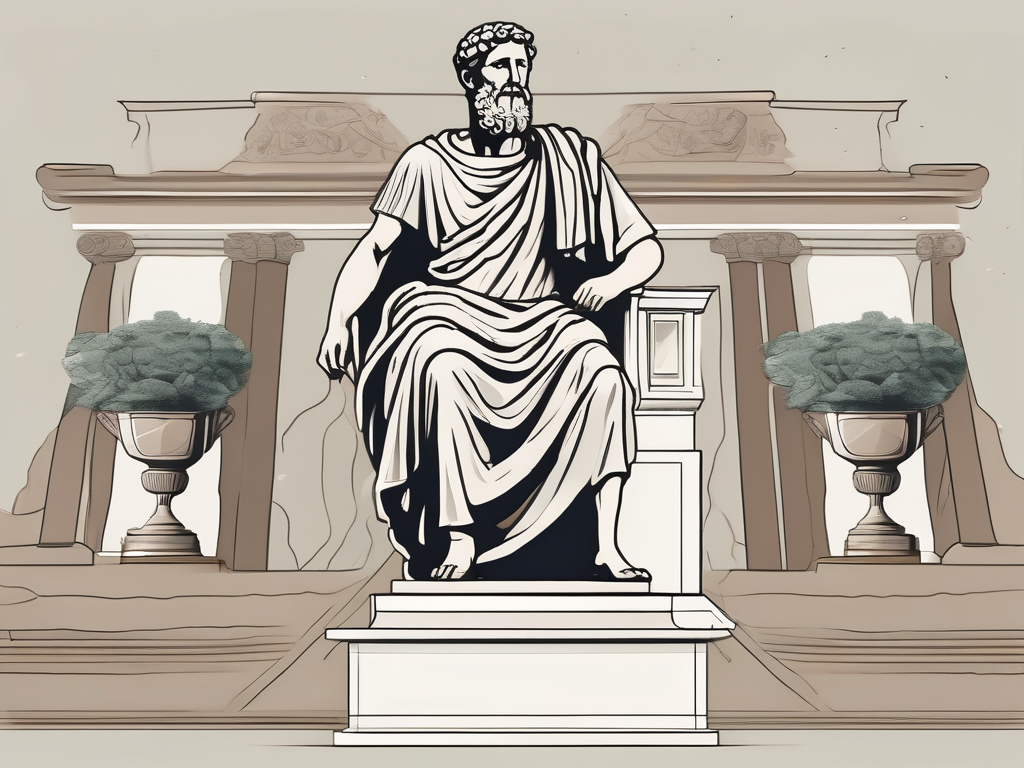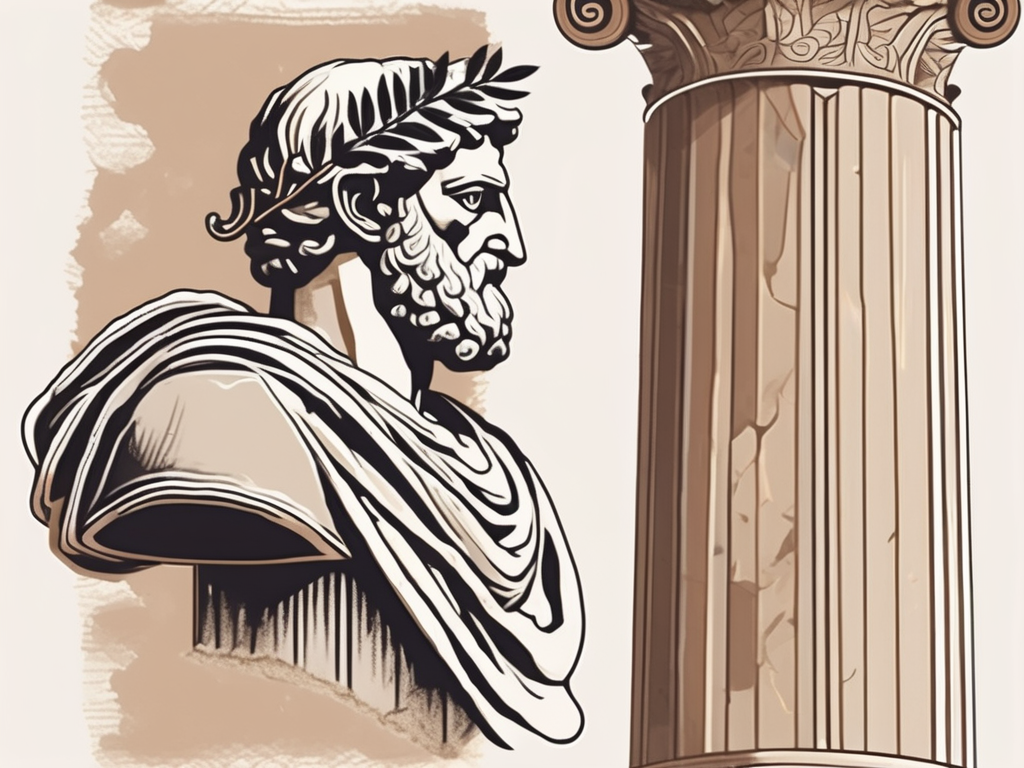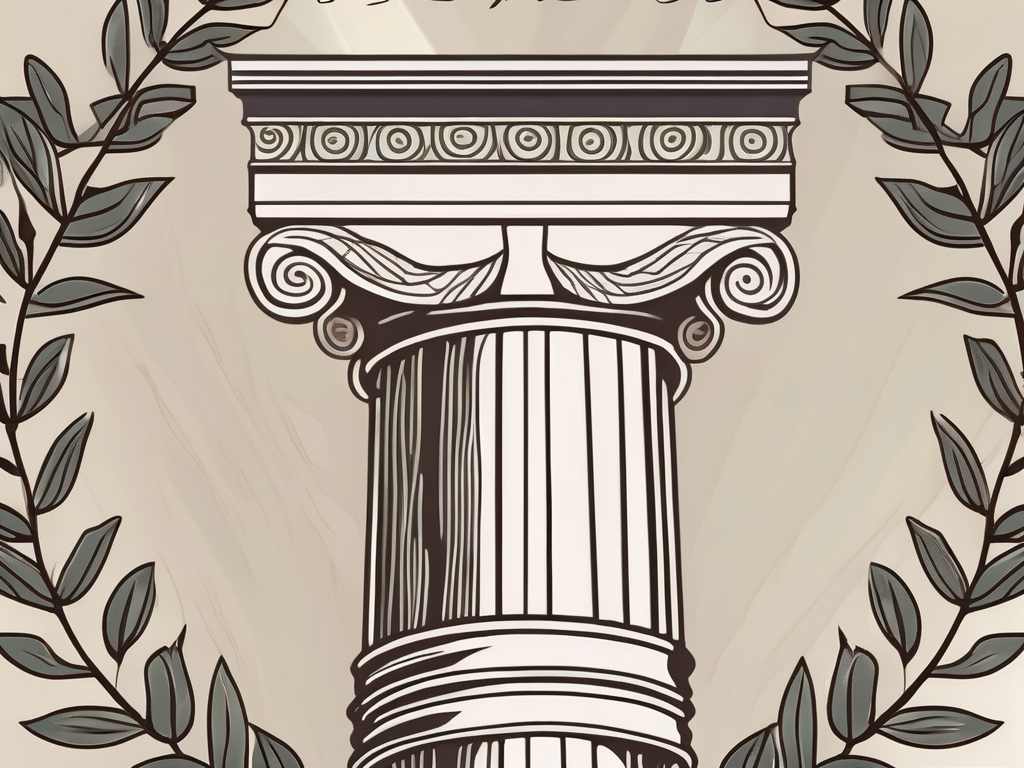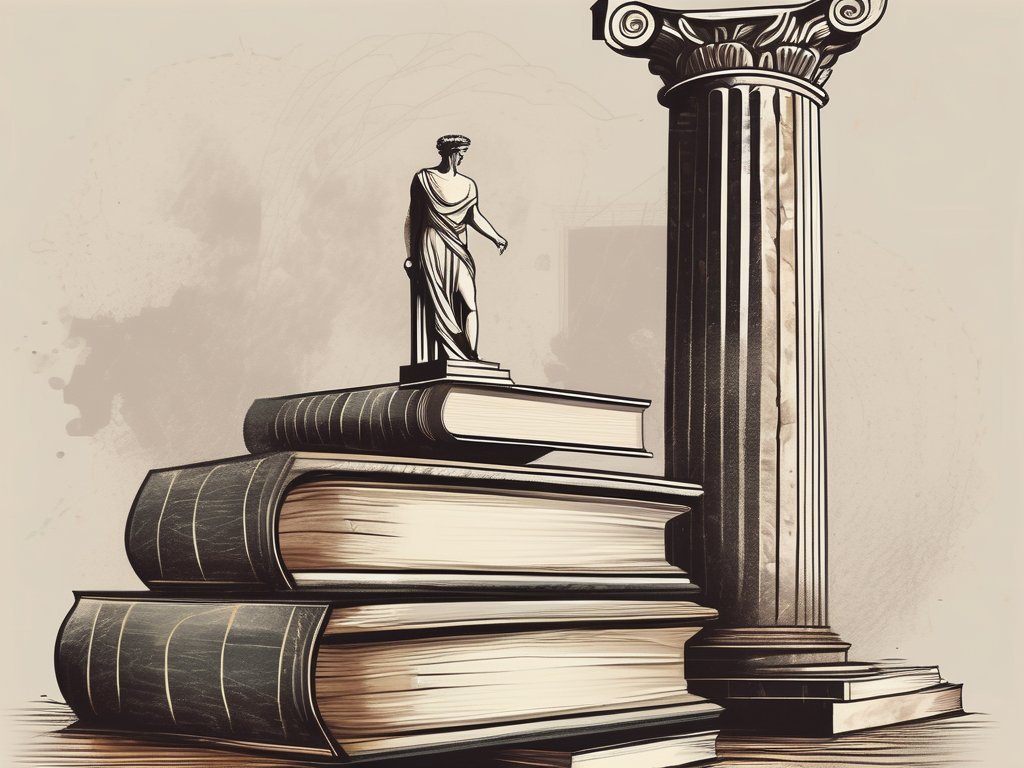In the realm of ancient philosophy, Diogenes of Babylon stands tall as one of the most influential figures within Stoicism. Often overshadowed by the more well-known Stoics, such as Epictetus and Marcus Aurelius, Diogenes paved the way for their teachings and left a lasting impact on the development of Stoic philosophy.
Understanding Diogenes of Babylon
Before delving into Diogenes’ contributions to Stoicism, it is essential to gain a deeper understanding of the man himself. Born and raised in the vibrant city of Babylon, Diogenes was exposed to a diverse range of cultures and ideas from a young age. His early life and education played a significant role in shaping his philosophical outlook and establishing the foundation of his teachings.
Diogenes was not just a passive observer of the cultural melting pot that was Babylon; he actively engaged with the various traditions and philosophies that thrived in the city. From an early age, he immersed himself in the teachings of the Chaldeans, the renowned astronomers and astrologers of Babylon. Their deep understanding of the cosmos and their ability to predict celestial events fascinated Diogenes and sparked his curiosity about the interconnectedness of all things.
Furthermore, the bustling marketplace of Babylon provided Diogenes with a unique opportunity to interact with people from different walks of life. He would spend hours conversing with merchants, artisans, and travelers, eagerly absorbing their stories and perspectives. These encounters broadened his understanding of human nature and instilled in him a sense of empathy and compassion.
Early Life and Education
Diogenes grew up in a household that valued intellectual pursuits. His parents, both avid readers and thinkers, nurtured his inquisitive nature from an early age. They would often engage in lively debates and discussions, encouraging Diogenes to question conventional wisdom and explore alternative viewpoints.
It was not just the intellectual environment at home that shaped Diogenes’ early years. Babylon, with its rich history and diverse population, offered a multitude of educational opportunities. Diogenes had access to a wide array of philosophical texts and discussions, which laid the groundwork for his deep interest in wisdom and self-improvement.
As he grew older, Diogenes sought out renowned philosophers and scholars to further his education. He studied under prominent Stoic teachers, eagerly absorbing their teachings. It was during this time that he developed a keen interest in the Stoic philosophy, which would become the cornerstone of his own insights and contributions.
Diogenes’ thirst for knowledge was insatiable. He not only studied Stoicism but also delved into other philosophical schools of thought, such as Epicureanism and Cynicism. By exploring different perspectives, he sought to gain a comprehensive understanding of the human condition and the various paths to leading a virtuous life.
Philosophical Beliefs and Teachings
Diogenes’ philosophical beliefs aligned closely with the core tenets of Stoicism. He emphasized the importance of reason and virtue in leading a fulfilling life. Diogenes believed that personal happiness and inner peace could be achieved by aligning oneself with nature and living in harmony with the divine order of the universe.
Central to Diogenes’ teachings was the concept of living in accordance with nature. He encouraged individuals to understand and accept the things they could not control, focusing instead on developing virtuous character traits such as wisdom, courage, and self-discipline. Diogenes firmly believed that by cultivating these virtues, one could navigate life’s challenges with equanimity and find true contentment.
Diogenes’ approach to Stoicism was not purely theoretical; he emphasized the importance of putting philosophy into practice. He advocated for the integration of philosophical principles into everyday life, urging his students to apply Stoic teachings in their interactions with others and in their pursuit of personal growth.
Furthermore, Diogenes was known for his practical wisdom and his ability to provide practical advice to those seeking guidance. He would often use anecdotes and parables to illustrate his teachings, making his lessons accessible and relatable to a wide range of individuals.
In conclusion, Diogenes of Babylon was not only a philosopher but also a product of his vibrant and intellectually stimulating environment. His early life in Babylon, coupled with his relentless pursuit of knowledge, shaped his philosophical outlook and laid the foundation for his contributions to Stoicism. By understanding the context in which Diogenes lived and the depth of his philosophical beliefs, we can truly appreciate the wisdom and insights he has left behind.
The Role of Diogenes in Stoicism
While Diogenes may not be as well-known as other Stoic philosophers, his contributions to Stoic philosophy cannot be underestimated. His ideas and teachings laid the groundwork for later Stoic thinkers, shaping the evolution of the philosophy in profound ways.
Diogenes, born in Sinope, a Greek colony on the coast of the Black Sea, lived during the 4th century BCE. He was known for his unconventional lifestyle and his commitment to living in accordance with nature. Diogenes believed that true happiness and fulfillment could be achieved through self-discipline, virtue, and a rejection of material possessions.
Contributions to Stoic Philosophy
Diogenes’ unique insights into Stoicism enriched the philosophy as a whole. He placed a strong emphasis on reason and logic, advocating for critical thinking and rationality as essential tools for navigating life’s challenges. Diogenes encouraged individuals to question their beliefs, examining them from all angles to gain deeper insight and understanding.
One of Diogenes’ notable contributions was his concept of “living according to nature.” He believed that by aligning one’s actions and thoughts with the laws of nature, individuals could find inner peace and live a life of virtue. This idea resonated with many Stoics who came after him, as it provided a practical framework for ethical living.
Furthermore, Diogenes introduced practical exercises and techniques that aimed to cultivate virtue and self-improvement. He believed that philosophy should not be confined to mere intellectual discourse, but rather, should be applied in daily life to bring about meaningful change. Diogenes encouraged individuals to engage in self-reflection, to practice self-control, and to develop resilience in the face of adversity.
Influence on Later Stoic Thinkers
Diogenes’ ideas and teachings resonated deeply with later Stoic thinkers, who built upon his foundations and expanded upon his theories. His emphasis on living in harmony with nature and the pursuit of virtue paved the way for philosophers like Epictetus and Marcus Aurelius to develop their own unique approaches to Stoicism.
Epictetus, a former slave turned philosopher, drew inspiration from Diogenes’ teachings and incorporated them into his own philosophy. He emphasized the importance of accepting what is beyond our control and focusing on cultivating inner tranquility. Marcus Aurelius, the Roman emperor and philosopher, also acknowledged Diogenes’ influence, particularly in his writings known as “Meditations,” where he reflected on the principles of Stoicism.
Evidence of Diogenes’ influence can be found in the works of these prominent Stoics, as they often referred to his teachings and sought inspiration from his ideas. Diogenes’ impact on the development of Stoicism cannot be overstated, as his insights continue to shape the philosophical landscape even today.
In conclusion, while Diogenes may not have achieved the same level of recognition as other Stoic philosophers, his contributions to Stoicism were invaluable. His emphasis on reason, logic, and living in accordance with nature laid the groundwork for later Stoic thinkers and continues to inspire individuals seeking a path to virtue and inner peace.
Diogenes’ Key Philosophical Concepts
Diogenes’ philosophical concepts delve into various aspects of human existence, providing a comprehensive framework for leading a meaningful and virtuous life.
The Theory of Knowledge
Diogenes explored the nature of knowledge and our ability to attain wisdom. He contended that true knowledge arises from the careful examination of our beliefs, questioning their validity and seeking evidence to support or challenge them. By engaging in this philosophical inquiry, individuals can develop a deeper understanding of themselves and the world around them.
Ethics and Virtue in Diogenes’ Teachings
Ethics and virtue were central to Diogenes’ philosophical teachings. He believed that the ultimate goal of human life was to live in accordance with nature and cultivate virtuous character traits. Diogenes emphasized the importance of practicing self-discipline, courage, and wisdom, as they are the keys to leading a morally upright and fulfilling life.
Moreover, Diogenes stressed the significance of leading a life rooted in integrity and living up to one’s potential. He saw virtue not as a lofty aspiration but as something attainable through conscious effort and consistent practice. By embodying virtuous qualities, individuals can find contentment and live a value-driven existence.
Diogenes’ Impact on Modern Philosophy
Despite being an ancient philosopher, Diogenes’ influence extends beyond his time, resonating with modern thinkers and shaping contemporary thought.
Stoicism in Contemporary Thought
The Stoic philosophy, with its focus on resilience, self-improvement, and acceptance of the things we cannot change, continues to inspire individuals today. Diogenes’ emphasis on reason and virtue provides a blueprint for navigating the complexities of the modern world and finding inner peace amidst chaos.
Many individuals have turned to Stoicism as a practical philosophy for personal growth and well-being. The enduring relevance of Diogenes’ teachings is a testament to the timeless wisdom contained within them.
Diogenes’ Enduring Legacy
Diogenes’ impact on philosophy is undeniable. His contributions to Stoicism laid the groundwork for subsequent thinkers, shaped the evolution of the philosophy, and continue to inspire individuals to this day. Diogenes’ ideas serve as a reminder of the enduring power of philosophy to guide us on our quest for a meaningful and virtuous existence.
While Diogenes of Babylon may not be a household name, his influence on Stoicism and his invaluable contributions to philosophy make him a truly significant and influential figure worth exploring.












